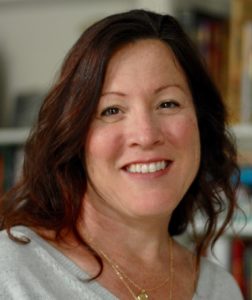While working in San Jose, Garcia found housing for more than 100 displaced due to Hurricane Katrina
![]()

Rebecca Garcia is the city of Morgan Hill housing director. Photo courtesy Rebecca Garcia
By Kelly Barbazette

Kelly Barbazette
Rebecca Garcia is passionate about advocating for everyone’s right to have access to a home.
“The lesson that my mom taught me is: you’re very important, but not all important,” said the city of Morgan Hill’s housing director. “She would say to me, ‘Share the resources, share the wealth.’”
I had the pleasure of talking with the 42-year-old Garcia recently about her role and her hopes for the future of housing in South Valley. Asked how she became interested in the important need for housing in the region, she said, “I don’t think I did. I think it found me.”
Born and raised in Gilroy, Garcia attended Gavilan College before graduating from San Francisco State University with a bachelor of arts degree in psychology.
She went on to earn her master’s degree in educational psychology at the University of Georgia, hoping to find a career as a therapist in schools. She returned home where she started working for the San Jose Office of Economic Development.
Then Hurricane Katrina happened. More than 100 displaced Louisiana residents came to San Jose. Working with different social service agencies, Garcia helped residents acclimate to the Bay Area and receive job training. She next worked for the San Jose Housing Department for five years before stepping into the role of housing and community development manager with the Santa Clara County Office of Supportive Housing where she served for five years.
There, she oversaw the community development block grant program, which entails working with community-based and nonprofit groups to create affordable housing on behalf of smaller cities — including Campbell, Los Altos, Morgan Hill, and Gilroy. She learned creating and preserving housing entails five “buckets,” including production of new inventory, the promotion of housing, the preservation of existing housing, supporting nonprofit developers who build affordable housing, and improving a community’s quality of life.
 “I think everyone deserves a safe, decent roof over their head,” she said. “It benefits the entire community.”
“I think everyone deserves a safe, decent roof over their head,” she said. “It benefits the entire community.”
When studying psychology, she learned that when people’s basic needs aren’t met, people aren’t able to elevate themselves and focus on goals like getting an education.
“Come hell or high water, I will advocate for all people to have safe, decent housing,” she said.
A key is to educate people about who will live in the housing that is being built.
“The fact of the matter is the majority of the people living in affordable housing are working,” she said.
A one-person household in Santa Clara County earning an annual salary of $92,250 or a four-person housing earning an annual salary of $131,750 is considered low-income.
The term affordable housing should be re-branded to “workforce housing,” Garcia said.
Low-income housing in Santa Clara County is 30 percent below private market rate, or a monthly rate of $1,011 for a one-bedroom and $2,527 for a three-bedroom.
Currently, Morgan Hill is processing 2,800 housing unit applications at various income levels.
“I’m fortunate to be a staff member here in Morgan Hill that has enabled me to grow and re-imagine our role in housing,” Garcia said, adding City Manager Christina Turner and the leadership team have been very supportive.
 Garcia enjoys creating programs that work where people can see tangible results as well as speaking for folks who can’t speak for themselves and sharing their stories.
Garcia enjoys creating programs that work where people can see tangible results as well as speaking for folks who can’t speak for themselves and sharing their stories.
“I think every city needs to have a voice for housing and affordable housing. If you don’t and you have a void, you have rumors and soundbites, and a narrative that isn’t based on facts.”
A new role created under Garcia is an “unhoused specialist” who has been reaching out to assess people’s needs, placing them on a county assessment list, and matching them with low-income housing as it becomes available. A non-profit group in San Jose is funding this position for three years.
“It’s been a game changer for us,” she said.
Garcia realizes what she is advocating for isn’t popular or what people may want to hear.
“It resonates with me when I hear people say, ‘Let’s try to maintain our small-town feel,’ but at what cost and what reality are we living in?” she said. “Because not many of our children 30 (years old) and younger can afford to rent or purchase a house here.”
Having fewer views and parking spaces is a trade-off to building more housing, she said. Being proactive and providing housing for the workforce, including teachers and medical workers, will help prevent more people from becoming homeless.
 “My job is not to tell people what they want to hear. My job is to tell them the truth,” she said. “We need more housing for our work force. And we need more housing for our homeless. And we need to keep equity in mind.”
“My job is not to tell people what they want to hear. My job is to tell them the truth,” she said. “We need more housing for our work force. And we need more housing for our homeless. And we need to keep equity in mind.”
Garcia and her team have to be strategic and smart about leveraging the resources that are available as they receive zero dollars to administer homeless programs.
“Having been here for seven years now, I feel like we’ve created this health and human services arm with limited resources,” she said.
The tremendous need and her desire to problem solve continue to propel her.
“I like changing systems and things so that we can get to the better. It’s really hard. That probably somewhat motivates me.”
Garcia recently received word that a family of three living in a safe parking program was moving into an apartment in Gilroy.
“I’m super happy for them,” she said. “I won’t get to meet everyone who gets housed, but I like knowing we’re doing our part as a small city.”
Garcia said her 2 ½ year old daughter also motivates her.
“I want her to be proud of her mommy, too,” she said. “I want to leave the world a better place for her and for everyone.”
Asked what advice she would give to women pursuing their goals, she noted if you’re passionate about what you’re doing, it’s likely a good fit because you won’t always feel like you’re working.
“You may end up working more hours,” she said and laughed. “I think we’re in a really cool new era to have an opportunity to be bolder than our mothers and grandmothers were. We’re just standing on the shoulders of a whole lot of women who didn’t have the same opportunities as us, so just do it. Take chances.”
Kelly Barbazette, a former journalist for Bay Area newspapers, is a freelance writer. She lives in Gilroy with her husband and two daughters. She can be reached at [email protected].






